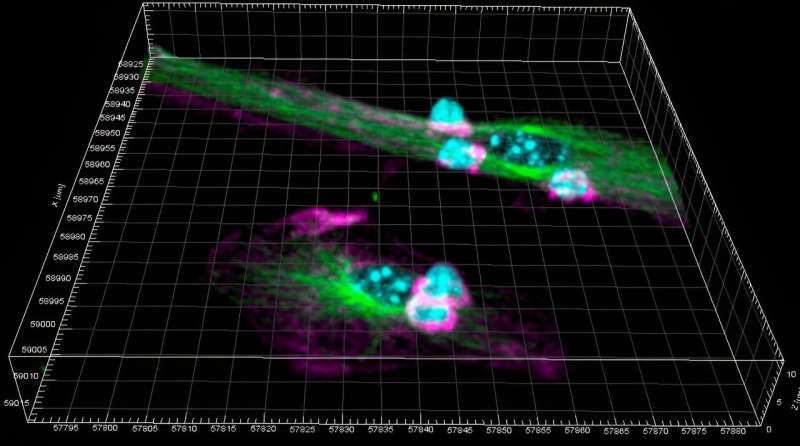This article has been reviewed according to Science X's editorial process and policies. Editors have highlighted the following attributes while ensuring the content's credibility:
fact-checked
peer-reviewed publication
proofread
Scientists identify changes in dendritic cells during the immune response with promising implications for vaccine design

A team of scientists at the Centro Nacional de Investigaciones Cardiovasculares (CNIC) and Hospital de la Princesa-UAM in Madrid have discovered that dendritic cells, an important cell type in the immune response to viral and bacterial infections, are profoundly changed by their involvement in this process in ways that were previously unknown.
In a study published in Nature Communications, the scientific team led by Prof. Francisco Sánchez-Madrid provide invaluable information about the mechanisms involved in the immune response to pathogens and point the way to the design of novel vaccines against future pandemics.
Study first author Dr. Diego Calzada Fraile explained that during the immune response to infection, "dendritic cells, which can be likened to sentries stationed in our tissues, are able to detect the pathogen, ingest or absorb it, and degrade it into small fragments which they present on their surface to lymphocytes, the effector cells of the immune system that can then recognize the pathogen and mount a specific response."
This process of antigen presentation requires the dendritic cell and its lymphocyte partner to come into close contact through the formation of a dynamic structure called an immune synapse, through which these cells can exchange information.
The study shows that the formation of the immune synapse not only activates the lymphocyte, as was well known, but also triggers profound changes within the post-synaptic dendritic cell.
The scientists describe important changes in the protein content of the post-synaptic dendritic cell. In addition, as Dr. Calzada Fraile explained, the study identifies "increased lipid peroxidation in dendritic cells as key mechanism for increasing the efficiency of antigen presentation to cytotoxic CD8 lymphocytes."
Using a mouse model developed by collaborators at the University of Padua in Italy, the scientists were able to analyze and manipulate post-synaptic dendritic cells that had interacted with T lymphocytes during an immune response in vivo triggered by vaccination with an antigen formulated with alum, the most widely used adjuvant used in human vaccines.
As Prof. Francisco Sánchez-Madrid explained, "Post-synaptic dendritic cells are responsible for the generation of specific CD8 lymphocytes in response to a vaccine, and thus present an attractive target for interventions aimed at stimulating CD8 lymphocyte responses during vaccination."
According to Prof. Francisco Sánchez-Madrid, the importance of this finding lies in the fact that "the effectiveness of a vaccine depends on its ability to trigger a strong CD8 response, because this determines the level of protection against a wide range of infections."
The potent ability of post-synaptic dendritic cells to activate cytotoxic CD8 T lymphocytes suggests that they have therapeutic potential as a type of vaccine that could be administered to boost the body's defenses against bacterial and viral infections.
One of the attractions of such a strategy is that "unlike conventional vaccines, the protection does not depend on the inclusion of material from the pathogenic organism, so this approach could be used to combat unknown pathogens that might emerge and cause a new pandemic."
More information: Diego Calzada-Fraile et al, Immune synapse formation promotes lipid peroxidation and MHC-I upregulation in licensed dendritic cells for efficient priming of CD8+ T cells, Nature Communications (2023). DOI: 10.1038/s41467-023-42480-3



















